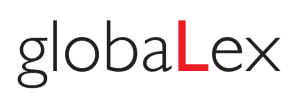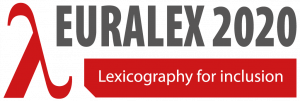EURALEX2020
Lexicography for Inclusion
| Date |
|---|
| 7. – 11.9.2021: EURALEX 2020 – Lexicography for Inclusion |
| Location |
|---|
| virtual |
Due to the pandemic situation, the conference needed to be postponed.
Hence, it will be carried out in a virtual format.
The conference proceedings are accessible already.
ELEXIS was acknowledged and/ or mentioned in the following EURALEX XIX papers :
- Mapping Domain Labels of Dictionaries
Salgado A., Costa R., Tasovac T. - Towards Automatic Linking of Lexicographic Data: the case of a Historical and a Modern Danish Dictionary
Ahmadi S., Nimb S., McCrae J., Sørensen N. - New developments in Elexifinder, a disocvery portal for lexicographic literature
Kosem I., Lindemann D. - License to use: ELEXIS survey on licensing lexicographic data and software
Kosem I., Nimb S., Tiberius C., Boelhouwer B., Krek S. - Interlinking Slovene Language Datasets
Bajčetić L., Declerck T. - Million Click Dictionary: Tools and Methods for Automatic Dictionary Drafting and Post-Editing
Jakubíček M., Kovář V., Rychlý P. -
Semantic data should no longer exist in isolation: the Digital Dictionary Database of Slovenian
Iztok Kosem, Simon Krek, Polona Gantar - Frisian Dictionaries, digitized from A to Z
Drenth E., Sijens H., Van de Velde H. - Principled Quality Estimation for Dictionary Sense Linking
Grosse J., Saurí R. - XD-AT: A Cross-Dictionary Annotation Tool
Gonzàlez M., Buxton C., Saurí R.
ELEXIS is supporting the GLOBALEX conference workshop on Lexicography and Neologism at EURALEX XIX!
The second iteration of Globalex Workshop on Lexicography and Neologism was held virtually in November 2020.
GWLN 2020 is supported by Globalex, the Global Alliance for Lexicography. It will follow on the first GWLN, which was held in conjunction with the DSNA 2019 meeting in Bloomington, IN, and of which selected papers will be published as a special issue of Dictionaries – Journal of the Dictionary Society of North America in spring 2020. Papers from the 2020 workshop are planned to be peer-reviewed for publication as a special of issue of International Journal of Lexicography, in 2021.
The aim is to offer cross-world views on lexicographic detection and representation of neologism for different languages.
A virtual substitute fo the workshop took place in November 2020.
The virtual workshop comprised six papers, each lasting 20 minutes + 5 minutes for questions.
The program is available here.
We invited papers discussing issues related to neologisms – including new words, new meanings of existing words, and new multiword units – in the context of lexicography and dictionaries, focusing on digital media.
Topics included, but were not limited to:
- how to find neologisms (corpus analysis and editorial means of identification; evaluation of data, e.g. blogs and chats)
- how to deal with grammatical/orthographic/pronunciation variation (descriptive vs. prescriptive)
- how to explain meaning with/without encyclopedic information, and how to use illustrations and audio-visual media
- how neologisms that are no longer new and those no longer used can be detected and should be dealt with in dictionaries
- how dictionary users can help with finding and informing about neologisms
- how well are neologisms accepted by the community (rejection and language purism; particular impacts on poorly-resourced languages) and reflected in dictionaries
- which fields (e.g. new media, sports, technology) enrich the dictionary with neologisms most of all
- does the dictionary borrow most neologisms from other languages (and which ones) and/or does the language in question use word formation to enlarge the lexicon
- when do foreign words that infiltrate another language become neologisms.
Wow!
70+ colleagues from all over the world took part in #GWLN2020 – including intense discussions on neologisms &…Gepostet von ELEXIS EU am Donnerstag, 5. November 2020







